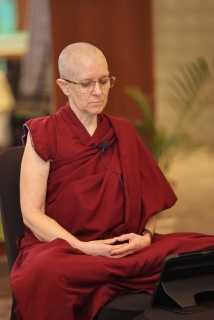

Buddhist Mind Science Module 1: Cultivating Lasting Happiness – What Buddhism & Science Say
06/16/2025 @ 6:30 pm - 07/02/2025 @ 8:00 pm
Cultivating Lasting Happiness: What Buddhism and Science Have to Say About It is the first in a new series at Maitripa College exploring the inner workings of the mind. Taught by Venerable Tenzin Drolma—a Maitripa alumna, licensed therapist, and ordained Buddhist nun—this course offers a unique perspective on the causes of suffering and the conditions for true well-being, drawing from both Buddhist wisdom and modern psychology.
Buddhist Mind Science Module 1: Cultivating Lasting Happiness – What Buddhism & Science Say
Mondays and Wednesdays, 6:30-8pm (PT)
June 16, 18, 23, 25, 30, July 2
In-person and online (Zoom) registration options: Register below for access to all classes and materials at the donation level of your choice.
About This Series: Explore the Mind: Buddhist Mind Science—Activating Your Potential: Offered online and in person, this three-module course bridges Buddhist contemplative tradition and modern science to illuminate how we can transform our lives from the inside out. Modules include:
- Module 1: Cultivating Lasting Happiness – What Buddhism and science teach us about genuine well-being
- Module 2: Transforming the Mind – Training in emotional resilience and inner peace
- Module 3: Getting to Know Your Mind – Guided inquiry into the functions and nature of mind
 Venerable Tenzin Drolma was born in Chicago, US, in 1961. She received her undergraduate degree in religious studies, philosophy and psychology. She has graduate degrees in Counseling Psychology from the University of Denver and in Buddhist Studies from Maitripa College. For 25 years she worked in the mental health field.
Venerable Tenzin Drolma was born in Chicago, US, in 1961. She received her undergraduate degree in religious studies, philosophy and psychology. She has graduate degrees in Counseling Psychology from the University of Denver and in Buddhist Studies from Maitripa College. For 25 years she worked in the mental health field.
Ven. Drolma was ordained as a nun in the Tibetan tradition in 2009. She moved to Vajrapani Institute and was resident sangha and assistant SPC for four years. From 2015 until 2022, she taught Introduction to Buddhism at Tushita Meditation Centre in India.
Ven. Drolma’s teaching style includes the psychological aspects of Buddhism and she has been described as a very approachable teacher. While strongly based in the tradition of the Gelukpa school, her teaching emphasizes those aspects most helpful to modern students.


